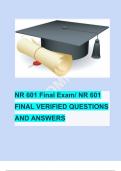A
VI
TU
IS
M
O
NR 601 Final Exam/ NR 601
A
FINAL VERIFIED QUESTIONS
N
JP
AND ANSWERS
,An 86-year-old female comes to your office for a wellness visit. Her blood pressure is 125/70
mmHg, pulse 69 beats per min, and respiratory rate 18 breaths per min. She is well appearing
and reports she is up to date on her routine vaccinations. She introduces her partner of 35 years
whom she would like to make medical decisions for her in case she becomes unable to make
decisions for herself. She reports that she and her partner are not married. She asks if she
needs any further documentation to ensure her goals of care are followed. Which one of the
following would be the most appropriate recommendation for this patient and her partner? -
ANSWER Advise them to file an advanced directive.
A
. An 81-year-old transgender female with history of depression and hyperlipidemia presents to
VI
your clinic for routine care. She endorses a history of smoking, currently smoking 1 pack per
day, and occasionally drinks a glass of wine, although she denies illicit drug use. She reports
TU
she takes atorvastatin 20 mg and subcutaneous estrogen therapy. - ANSWER Counseling on
smoking cessation
An 84-year-old male with history of stroke without residual deficit, systolic heart failure, and type
IS
2 diabetes presents to clinic for follow-up. He is independently living in a retirement community
and still works part time on a golf course. He currently takes aspirin 81 mg, metoprolol tartrate
M
25 mg BID (twice a day), furosemide 20 mg BID, and lisinopril 10 mg daily. He reports his last
colonoscopy was 8 years ago, with no abnormality. He reports he is sexually active with men
O
and women, engaging in receptive oral, receptive anal, and penetrative sex. He states he has
had over three sexual partners in the last year with intermittent condom use. What sexually
A
transmitted infection testing should be offered? - ANSWER Urine testing, blood testing, anal
swab, and oropharyngeal swab
N
Which of the following is true about tolterodine? - ANSWER It has greater risk of adverse
JP
effects with its twice-daily formulation.
An 82-year-old man, Mr. A, complains of worsening nocturia, occurring four times per night. His
other lower urinary tract symptoms are slow stream, occasional urgency, and urgency-related
leakage once weekly. Medical problems include poorly controlled hypertension, diastolic heart
failure, hyperlipidemia, osteoarthritis, and prediabetes. His medications include lisinopril 20 mg
daily, metoprolol succinate 75 mg daily, atorvastatin 10 mg daily, metformin 500 mg twice daily,
hydrocodone-acetaminophen as needed, and aspirin 81 mg daily. Amlodipine 5 mg daily was
, recently added by his cardiologist. On review of systems, Mr. A complains that nocturia is
causing daytime fatigue, and he is more constipated. Physical examination is notable for blood
pressure 162/83 mmHg, heart rate 60 beats per minute, clear lungs, soft abdomen, enlarged
prostate, and 21 pretibial edema. Your next step in management should be: - ANSWER Stop
amlodipine and increase lisinopril.
The daughter of a 79-year-old woman notes that her mother, who has dementia and lives with
her, is wetting herself when she attends her new day program. Program staff have requested
A
that "something be done" as she is requiring a clothes change nearly every time she is there.
She cannot describe the circumstances of leakage, saying "it just comes." Leakage is
VI
uncommon at home. Her medications include donepezil and acetaminophen. Physical
examination is normal. Initial treatment approach will require intervention by which of the
TU
following? - ANSWER Day program staff
. Ms. J, who is 82 years old, complains of urine leakage while playing golf. This has gotten
worse over the past year, and she rarely makes it through nine holes without feeling like she
IS
needs to "run into the bushes and go." Leakage is usually small volume, but causes her extreme
embarrassment because she is afraid she will smell of urine. She has tried limiting caffeine in
M
the morning before she golfs and avoiding drinking water while playing, to no effect. She also
tried "those Kegler" exercises in the past without success. Which of the following is the most
O
appropriate recommendation for Ms. J? - ANSWER Bladder training
A
What is the most common cause of erectile dysfunction in older men? - ANSWER
Atherosclerosis
N
Which is the most reasonable first step in the treatment of older men with erectile dysfunction? -
JP
ANSWER Sildenafil
A 72-year-old woman reports vaginal dryness that interferes with coitus. Her medical history
includes type 2 diabetes, hypertension, and osteoarthritis. Medications are glyburide,
chlorthalidone, and acetaminophen. What would be your first step in therapy? - ANSWER
Stop chlorthalidone




